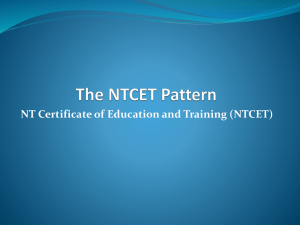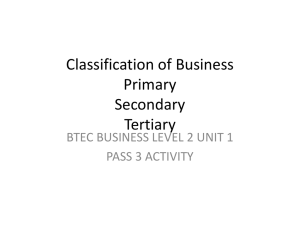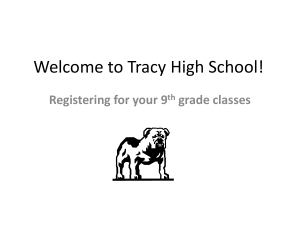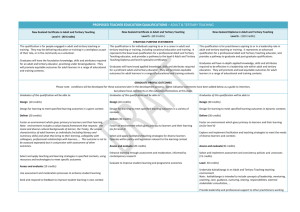the Decide and Prepare slides
advertisement
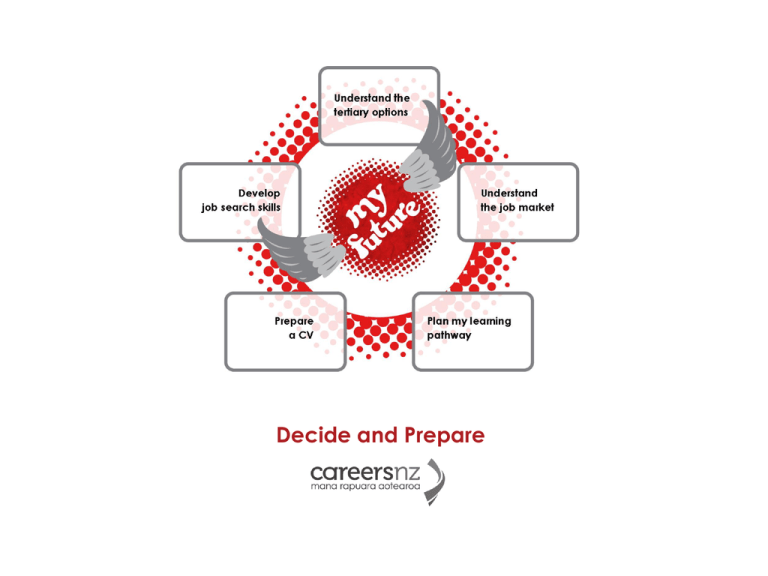
Decide and Prepare Understanding tertiary options Section 1 Decide and Prepare Careers New Zealand April 2012 Understanding tertiary options WHAT KINDS OF QUALIFICATIONS ARE THERE? qualification types Levels 7-10 degrees, graduate and postgraduate qualifications Levels 4-6 advanced trades, technical and business qualifications Levels 1-3 senior secondary education (eg, NCEA) and basic trades training qualification names bachelors, honours, masters, doctorates, PhDs certificates, diplomas, national certificates, national diplomas graduate and postgraduate certificates and diplomas typical completion times for full-time study certificates general, national, graduate, postgraduate a few months, up to 1 year diplomas general, national, graduate, postgraduate 1 or 2 years, can be more bachelors degrees, honours degrees 3 or 4 years, can be 5 masters degrees 2 years doctorates, PhDs 3 years the meaning of words study training When people talk about study they are often talking about learning at an education provider, eg, school or university. When people talk about training they are often talking about learning on the job. But, some study courses include on-the-job training through work placements. But, many workplace training programmes include off-the-job study. Understanding tertiary options WHERE CAN I GET A QUALIFICATION? tertiary providers 3 8 20 38 + wānanga universities polytechnics and institutes of technology (ITPs) industry training organisations (ITOs) hundreds of private training establishments(PTEs) Understanding tertiary options CAN I DO ANY COURSE I WANT? entry requirements vary … from course to course and place to place. – You might need a set number of credits in particular school subjects. – When there are a limited number of places in a course, meeting the minimum entry requirements might not be enough. – Course providers may want to see portfolios, experience in the workplace, evidence of commitment or certain personal qualities. entry to university Example: BA in history at Victoria University – Minimum requirement is University Entrance – For guaranteed entry you need a score of 150 points based on up to 80 of your best credits – For example, 10 credits at excellence (40pts), 10 credits at merit (30pts) and 40 credits at achieved (80 pts). • excellence=4 pts, merit=3 pts, achieved=2 pts entry to polytech/institute Examples from Weltec: • Diploma in Health Psychology Level 5 – NCEA level 2 with 36 credits in three subjects. • National Diploma in Architectural Technology Level 6 – 50 credits at NCEA Level 2, with at least 12 credits in each of Maths, Science and English. Alternatively, applicants 20 years of age or older are welcome to apply. – Successful completion of selected unit standards is necessary to gain entry into the second year of this programme. entry to workplace training Example: Retail modern apprenticeship – You need to find a job in the industry and a boss willing to train you first. – Requires you to successfully complete 147 credits at Levels 2 and 3 while you are working, so it helps to have NCEA Level 1 plus literacy and numeracy. flexible options There are options that allow you to continue to explore what suits you as you go. – These may be a good idea if you know the broad area you are interested in but aren’t sure what sort of job you’re heading for. – Examples are: a general degree, eg, Bachelor of Arts or Science Pre-trade training, eg, plumbing what you can do now Think about … Start thinking about the way you might want to learn once you finish school. The tertiary study and training options available offer you different ways of learning. Think ahead … When you choose your senior school subjects, check out whether your subjects will allow you to get into the tertiary study and training pathways you might want to follow. Finding your networks Section 2 Decide and Prepare Careers New Zealand April 2012 Your network is … church group . ministers . boss teachers . coach . team mates neighbours . hairdresser . vet barista . gas station guy doctor . chemist The people who know you well The people who sort of know you parents . sisters brothers . close friends classmates . aunts . uncles cousins . grandparents co-workers . fellow students club or group members The people you can start a conversation with Often it is these people who give you the best new leads Networking is … person 3 you goal person 1 X person 2 X Networking example Jo wants to explore nursing as a career option cousin Jo friend (nursing home manager) doctor family friend colleague (nurse) colleague (nursing agency) minister church member (social worker) aunt friend (case manager) Doing it right Think about how you can make a good first impression appearance friendliness curiosity honesty Prepare yourself to emphasize your positive qualities MUST DO #1 Create a positive impression of yourself People say I’m … I’ve had good feedback about … Doing it right You can tell people about what you are looking for without directly asking for help. This may lead you to someone who could help you. Decide what is reasonable to ask of people. MUST DO # 2 Tell people about your interests and goals How strong is your connection? How willing is the person? How much hassle is your request? www.careers.govt.nz Career Kete, Decide and Prepare section, April 2012 The information on networks in this presentation is based on ideas in Teaching Networking Skills: Paving a Way to Jobs and Careers, Aug 2008, Institute for Community Inclusion, UMass Boston. Downloaded December 2010 from http://www.communityinclusion.org/article.php?article_id=251
